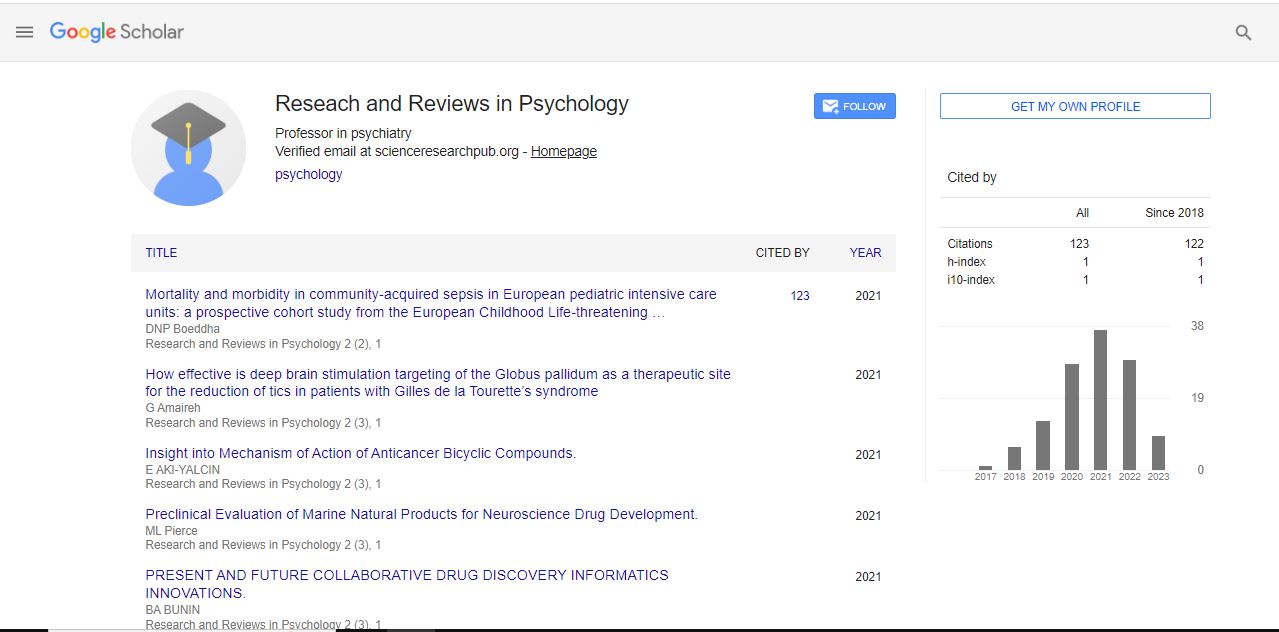Commentary, Res Rev Phys Vol: 4 Issue: 4
Psychological Resilience and Chronic Illness
Dena Shelli*
1Department of Sociology, Cornell University, Ithaca, USA
*Corresponding Author: Dena Shelli,
Department of Sociology, Cornell
University, Ithaca, USA
E-mail: shelli.dena@cu.edu
Received date: 28 November, 2023, Manuscript No. RRPY-23-124314;
Editor assigned date: 30 November, 2023, Pre QC No. RRPY-23-124314 (PQ);
Reviewed date: 15 December, 2023, QC No. RRPY-23-124314;
Revised date: 22 December, 2023, Manuscript No. RRPY-23-124314 (R);
Published date: 29 December, 2023, DOI: 10.4192/rrpy.1000357
Citation: Shelli D (2023) Psychological Resilience and Chronic Illness. Res Rev Phys 4:4.
Description
Chronic illness presents a complex and enduring challenge to individuals, impacting not only their physical health but also their psychological well-being. In the face of such adversity, the concept of psychological resilience emerges as a crucial factor in determining how individuals cope, adapt, and thrive despite of the ongoing challenges posed by chronic health conditions. This commentary explores the complex between mental fortitude and the management of long-term health conditions, shedding light on the flexibility mechanisms that enable individuals to navigate the complexities of chronic illness with strength and adaptability.
Resilient individuals often employ adaptive coping strategies to manage stressors associated with chronic illness. This may involve problem-solving, seeking social support, engaging in positive reframing, and adopting a proactive approach to healthcare management. Emotional regulation is a core component of flexibility. Individuals who can navigate and regulate their emotions effectively are better equipped to cope with the emotional that often accompanies chronic illness. This includes managing anxiety, depression, and the emotional impact of physical symptoms. Certain personality traits, such as optimism, flexibility, and a sense of self-efficacy, contribute to resilience. Optimistic individuals tend to approach challenges with a positive outlook, viewing setbacks as temporary and attainable.
A sense of control over one's life and health is closely tied to resilience. Individuals who believe they have some control over their circumstances are more likely to engage in proactive health behaviors and cope effectively with the challenges posed by chronic illness. Social support from family and friends plays a pivotal role in fostering flexibility. Strong social connections provide emotional support, practical assistance, and a sense of belonging, all of which contribute to an individual's ability to navigate the ups and downs of chronic illness. In addition to personal relationships, engagement with supportive communities and peer networks can enhance resilience. Sharing experiences with others facing similar challenges fosters a sense of understanding, reduces feelings of isolation, and provides valuable insights into coping strategies. Resilient individuals often demonstrate a capacity for acceptance and adaptation. This involves acknowledging the reality of the chronic condition, adapting to changes in lifestyle or abilities, and finding new ways to engage in meaningful activities.
Finding meaning and purpose in the face of chronic illness can contribute to complex. Whether through personal growth, spiritual beliefs, or contributing to others in similar situations, individuals often draw strength from a sense of purpose beyond their health challenges. The quality of the patient-provider relationship is critical in promoting complex. A collaborative and supportive healthcare environment, where individuals feel heard, informed, and involved in decisionmaking, fosters a sense of partnership in managing chronic conditions. Recognizing and addressing the psychological impact of chronic illness, mental health services become an integral component of comprehensive healthcare. Access to counseling, psychoeducation, and mental health resources can support individuals in developing resilience and coping skills. Stigma associated with certain chronic conditions can pose a significant challenge. Misunderstandings about the nature of the illness may contribute to feelings of isolation and hinder the development of resilience. Limited financial resources and access to healthcare resources can strain an individual's ability to manage chronic conditions effectively. These external challenges may test resilience and necessitate creative problem-solving.
Educational programs that provide information about the chronic condition, available resources, and coping strategies can empower individuals. Understanding the illness and its management fosters a sense of control and enhances flexibility. Mind-body interventions, such as mindfulness, meditation, and yoga, have shown promise in enhancing flexibility. These practices promote emotional regulation, reduce stress, and contribute to an overall sense of well-being. The integration of technology, including mobile health applications and telehealth services, holds potential for supporting resilience in chronic illness. These tools can provide real-time monitoring, educational resources, and connections to virtual support networks. Longitudinal studies tracking individuals with chronic illness over time can deepen our understanding of resilience development. Examining the factors that contribute to sustained resilience and identifying critical intervention points can inform targeted support strategies.
The multifaceted dynamics of navigating long-term health challenges with strength and adaptability. From understanding the personal and social factors that contribute to resilience to exploring effective coping strategies, this exploration underscores the importance of a holistic approach to healthcare-one that addresses not only the physical aspects of chronic conditions but also the psychological flexibility that empowers individuals to lead fulfilling lives despite ongoing health challenges. As research continues to unravel the complexity of flexibility, the integration of these insights into clinical practice holds the potential to enhance the well-being and quality of life for those managing chronic illnesses.
 Spanish
Spanish  Chinese
Chinese  Russian
Russian  German
German  French
French  Japanese
Japanese  Portuguese
Portuguese  Hindi
Hindi 